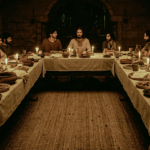Over recent weeks there have been a number of pop culture touchstones that have proved how problematic online ‘unsocial’ trolling has become, in particular racism and misogyny. Most recently this has been on display at Disney D23 Convention (9-11 Setpember 2022), which is a showcase that Disney uses to promote its upcoming TV shows and films to its audience.
Despite what you think about Disney constantly recycling its IP with “live action” versions of its classic animation titles, there seems to be nothing that will upset the fragile online behaviour of internet trolls more than casting talented Black actor Halle Bailey as Ariel in the live action CGI remake of The Little Mermaid.
“The reactions to the release of the “live-action” Little Mermaid teaser were so predictable we hardly need to go over them here. Even if you didn’t pay any attention to the online chatterboxes on social media, you can probably guess the basic plot points, especially if you know the role of Ariel went to Halle Bailey,” reported Relevant Magazine. “The notion of a Black mermaid seemed to upset the already fragile apple carts of a number of internet racists’ minds, who made a lot of idiotic noise about Disney’s “woke agenda.” It’s not entirely clear that these people had any cherished memories of watching The Little Mermaid as kids.”
Now, it’s clear that Disney is remaking these classics for a new audience, while also remaking some of their classics (which had some problematic stereotypes). What isn’t clear is why racism, misogyny and bullying seems to have a very comfortable home online, where keyboard warriors can vent their outrage 24/7.
The International Network for Hate Studies has a theory. The more we move online, the more we move away from physical, in-person interaction and the ability to practice empathy. In its’ 2020 article The ‘Unsocial’ facets of social media platforms, the belief is that “while this disruptive technology has experienced an impressive exponential growth rate in the number of monthly active users and revenue, there is also evidence revealing that social media has become a breeding ground for the dissemination of a myriad of unsocial behaviour. Concurrent with this growth, a surge in bigotry, racism, hate speech, xenophobia, cyberbullying, and suicide of young people has also been observed , where social media has not only contributed to their emergence but has also amplified and exacerbated them in alarming proportions.”
There is also no doubt that a global pandemic may have exacerbated this problem. Social isolation can and does lead to an empathy deficit, the inability to “walk in another persons shoes.”
Such was also the case with the recent Amazon series The Rings of Power, whose rabid fanbase had a major issue with the diversity of this fictional retelling of Tolkien’s work. Perhaps even more problematically, Tolkein’s fanbase some would assume contain a large contingent of Christians, as both Tolkien and C.S. Lewis’ work springs from their Christian background.
Previous adaptations of Tolkien’s work have included mostly white, mostly male casts, while Amazon’s series imagines a world in which people of colour and women are central figures. Characters of color include a queen regent (Cynthia Addai-Robinson), an elf warrior (Ismael Cruz Córdova), dwarf royalty (Sophia Nomvete) and the leader of the Harfoots (Lenny Henry).
USAToday reported that “some actors of color have experienced “relentless racism, threats, harassment and abuse.” The series has been subject to the online trolling practice of “review bombing,” in which a minority group of displeased viewers tanks audience reviews on sites like Rotten Tomatoes and IMDb. On Rotten Tomatoes, the critic score sits at 85% but the audience score is a low 39%. On Prime Video itself, reviews have been suspended.
This type of harassment unfortunately isn’t new or uncommon. The recent Obi Wan Kenobi series had to rally around actor Moses Ingram, who had a central role. As Forbes reported: “The Star Wars fanbase is infamous for its toxic fringe, the loud minority of hypercritical “fans” that harass actors for daring to play their parts, their criticism overwhelmingly infused with sexist and racist commentary.”
On Instagram, Ingram posted screenshots of some of the hateful messages she received, and posted an Instagram story in which she said: “There’s nothing anybody can do about this. There’s nothing anybody can do to stop this hate. I question my purposes in even being here in front of you saying that this is happening. I don’t really know.”
Even before this the most high-profile case of online harassment came about when the sequels to the Star Wars franchise were released, actor Kelly Marie Tran experienced so much harassment that she closed her social media accounts for a time.
With all of these examples, is it any wonder that online racism has become a problem for the impressionable digital natives who are online all the time and unfettered in their access. The examples adults are setting online and the trolling and other bullying behaviour seems to get worse every year despite education to the contrary.
Online activity is there always. It’s traceable and it isn’t faceless.
It’s clear that as Christians we have a responsibility to take these spaces back. It’s a good thing that content (TVs and movies) are finally starting, with small steps, to reflect the diversity that surrounds us. But there is still a long way to go.
One of the lessons learned is that perhaps the online space needs to be taken back, for as Halle Bailey fans have proved, and Relevant reported: “There is never a bad time to shut racists up, and a Little Mermaid teaser is as good an opportunity as any. The more racists are made aware that their white supremacist vision of the world is unwelcome online or anywhere, the better for us all.”













